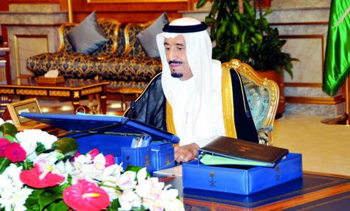 Jeddah, Sep 3: Saudi Arabia will not be lenient with violators of Haj regulations, the Council of Ministers said Monday, reaffirming the Kingdom’s move to prevent Saudis and expatriates from performing the annual pilgrimage without Haj permits.
Jeddah, Sep 3: Saudi Arabia will not be lenient with violators of Haj regulations, the Council of Ministers said Monday, reaffirming the Kingdom’s move to prevent Saudis and expatriates from performing the annual pilgrimage without Haj permits.
“The Kingdom will be strict in executing punishment on violators of Haj regulations,” said Culture and Information Minister Abdul Aziz Khoja after the Cabinet meeting, which was chaired by Crown Prince Salman, deputy premier and minister of defense.
The Cabinet was referring to the public awareness campaign titled “Haj is Worship and Civilized Behavior,” which was launched by Makkah Gov. Prince Khaled Al-Faisal on Sunday, ahead of the pilgrimage that begins on Oct. 13.
Expatriates going for Haj without valid permits would be deported immediately and will not be allowed to come back to Saudi Arabia for 10 years, Prince Khaled said during the launching ceremony. Tough punishments will be imposed on unauthorized Haj agencies and owners of vehicles that help undocumented pilgrims reach the holy sites.
The Cabinet urged all government departments and private agencies to make all preparations to provide the best possible services to the guests of God. The government has decided to reduce the number of foreign pilgrims by 20 percent and domestic pilgrims by 50 percent this year because of ongoing expansion works at the Grand Mosque in Makkah.
Khoja said the Cabinet discussed a number of cultural, scientific and economic activities witnessed by the Kingdom last week. It commended Custodian of the Two Holy Mosques King Abdullah for endorsing a program to support the steadfastness of Palestinian cities and donating $200 million for the project.
The program, which was announced at a conference of Organization of Islamic Capitals and Cities in Makkah on Sunday by Minister of Municipal and Rural Affairs Prince Mansour bin Miteb, aims at developing Palestinian cities.
The Cabinet was also briefed on the Kingdom's participation in the Beijing International Book Fair. The Saudi pavilion at the fair attracted a large number of visitors. The Cabinet thanked China for selecting the Kingdom as the first Arab and Muslim guest of honor of the Beijing Book Fair.
The Cabinet meeting also appreciated the measures taken to ease the burdens of litigation with the opening of the qualitative specialization sections within specialized courts and the intensification of training support for judges.
The Cabinet approved the agreement with Kuwait in the field of air transport services, which was signed in Jeddah on last Oct. 1. It endorsed the membership of the Ministry of Islamic Affairs, Endowments, Call and Guidance in the Standing Committee for Money Laundering.
The Cabinet decided to add a representative of the Investigation and Public Prosecution Bureau to the committee on combating organized crimes and human trafficking at the Human Rights Commission.
It appointed Sulaiman bin Saleh Al-Nasyan assistant undersecretary for school affairs at the Ministry of Education; Abdulmohsen bin Musaed Suwailem consultant engineer at Riyadh Mayoralty; Adi bin Faleh Al-Buqami secretary of the Regional Council at Eastern Province Governorate; Saud bin Abdullah Al-Obaisi assistant undersecretary for services at Riyadh Mayoralty; and Abdullah bin Zaid Al-Rajeh assistant undersecretary for security affairs at Baha Governorate.





Comments
Add new comment